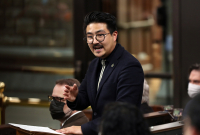Support strong Canadian climate journalism for 2025
It was a common refrain heard from Conservative party members gathered in Edmonton to watch the leadership debate: I like Leslyn Lewis, but I'm picking Pierre Poilievre.
“I wouldn’t be heartbroken if she won," said Deborah Price, who is a fan of what Lewis stands for and how she comes off as down to earth.
"But you know, I’m all Pierre.”
Lewis surprised many with her strong showing in the party's 2020 leadership race after entering as an unknown. But how she does this time around is one of the big questions hanging over the race, described by some as a fight for the party's soul.
There are two big differences in this contest. One is that people know who she is. The former lawyer and Jamaican immigrant ran and was successfully elected as an MP for a rural Ontario riding in last year's federal election.
The second — and perhaps more challenging — is that she is running against Poilievre, an Ottawa MP since 2004, who boasts a massive social media following and is running on a campaign of freedom. He's popular among the grassroots in Alberta and Saskatchewan, the latter of which Lewis won in 2020.
Poilievre's presence now has former Lewis supporters like Mathias Deuel seeing more options.
The young Tory likes how both come across as "unapologetically Conservative."
In the last race, he said he felt Lewis was the best option out of the candidates. They included Peter MacKay, a former federal cabinet minister and past leader of the Progressive Conservatives, and Erin O'Toole, the Ontario MP who ultimately won.
"That’s different now," Deuel said.
"Pierre Poilievre brings something that the other candidates didn’t have last time around. I think he brings a different message and a different type of Conservative message."
Dave Haarsma, who describes himself as undecided but strongly leaning to Poilievre, wishes he could have it both ways.
"I love Leslyn, actually. I would love to see Poilievre and Leslyn combine," he said.
For him, what makes the difference is Poilievre's ability to speak French fluently.
Marcia Schultz, who supported Lewis in 2020, is watching for the same.
Many Conservatives watched as Lewis stuck mostly to prepared notes in that race's French debate. The event for the current race will take place in two weeks.
"I’m curious to see whether she’s able to connect and articulate in the French language this time around," Schultz said.
Lewis's campaign said she's been taking lessons consistently since the last race.
Steve Outhouse, who is once again managing her campaign, acknowledged both she and Poilievre are in many ways fishing from the same pool of Conservative supporters.
"We see just as many people telling us they signed up at Pierre's rally, but are now voting for (Lewis)," he said in a statement.
"With multiple strong candidates, it is not a surprise that at this point the leadership race is still up for grabs."
A major difference for Lewis supporters, when comparing her to Poilievre and other candidates, is her social conservative outlook and the fact that she’s upfront about it.
Lewis opposes abortion and in the last race told supporters about a decision she made not to terminate her pregnancy while in law school. She is also reviving what she calls her "no hidden agenda" platform, which includes promises to ban so-called sex-selective abortions and protect women from being coerced into the procedure — policies she believes even those who support abortion rights are more likely to accept.
In this race, she has questioned Poilievre about his own views on abortion and during Wednesday's English debate pressed him on whether he would allow caucus members to vote with their conscience.
Poilievre has said that a government led by him would not introduce or pass legislation restricting abortion, but would also allow Tory MPs to vote freely on the topic.
Saskatchewan MP Cathay Wagantall, a Lewis backer, recently sent an email to supporters arguing that while other leadership candidates “scrambled” to respond to a leaked U.S. Supreme Court draft decision that would overturn abortion rights in that country, Lewis's position was already clear.
"Let's elect a leader who already has a plan that will beat the Liberals when it comes to the issue they always used to divide," Wagantall wrote.
Other party members are more skeptical.
"As much as I disagree with it, we’re not going to get away from it, " Carol Anderson said.
"I'd far rather see some other ideas debated and I don’t think she will get elected just over that one policy."
In another email to supporters, New Brunswick MP Richard Bragdon talked up how Lewis was not a career politician.
Although most of the more than a dozen people who spoke to The Canadian Press said they were either fully supporting or likely backing Poilievre, some were still searching for more from him.
"He’s got a bit of a combative style, which is entertaining. Is it prime ministerial?" asked Arlene Reid, from the nearby town of Drayden Valley.
Members Bob Silversides and Teresa Larsen, like many, were drawn to the popular Conservative through his commanding House of Commons performances and razor-sharp, slickly delivered messages on inflation and the economy. But they want to hear what he has to say on other topics.
“How are we going to handle these prescription programs and daycare programs, all of these things that are rolling out?" asked Silversides.
Larsen added: "Right now, he’s saying the same message over and over again.”
This report by The Canadian Press was first published May 13, 2022.




Comments
Oh, come out and say it: strong social conservatives likely harbour a subconscious discomfort with handing power to a Black woman. (On the other hand, that makes her the perfect cover for social conservatism, hard to attack for it, personally. But that's not enough for most social conservatives.)
So, they praise her, but hand power to PP.